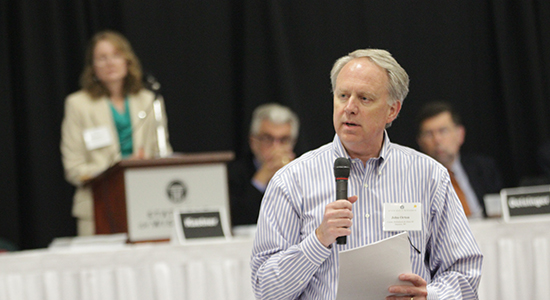
Dist. 7 Gov. John Orton comments during the Board meeting. The board elected him along with five other members to the State Bar’s Executive Committee for FY 2017.
June 15, 2016 – Lawyers will be able to designate successor counsel to protect clients through a registry on file with the State Bar of Wisconsin, the organization’s Board of Governors decided today at its final board meeting of the fiscal year in Green Bay.
The board directed State Bar staff to develop a succession planning registry for members to voluntarily name successor counsel in the event that they are unable to continue their law practices through death, disability, or other incapacity. Staff will also develop procedures and guidelines to gather, store, and distribute the information.
Last year, State Bar President Ralph Cagle formed a Succession Planning Working Group, chaired by retired Chief Appeals Court Judge Richard Brown, to address the problems that arise when lawyers and law firms do not name successor counsel.
Cagle noted anecdotal evidence of cases where an attorney becomes incapacitated or dies and neither the personal representative nor the clients know what to do.
Because attorneys have an ethical duty “to act with reasonable diligence and promptness in representing a client,” Cagle noted that a clear succession plan allows attorneys to ensure that clients will not be neglected if a successor is needed.
The Succession Planning Working Group proposed, and the board approved, the following recommendations for immediate action:
-
Create a registry through the State Bar’s website, WisBar.org, with basic succession planning information that could be accessed by judges, clients, or others in the event of a lawyer’s disability, incapacity, or death;
-
Publicize the registry and provide an easy mechanism for registration, such as providing the successor information along with annual dues statements;
-
Provide education and training on succession planning and the registry through continuing legal education (CLE) programming;
-
Encourage law schools to address succession planning and the State Bar’s registry as part of law schools’ ethics courses;
-
Pay professional liability insurance coverage for attorneys who serve as successor counsel, for a reasonable period of time, just as the State Bar covers pro bono attorneys who work through State Bar pro bono programs; and
-
When necessary, revise the Solo, Small Firm and General Practice Section’s succession planning manual, “After All, You are Only Human: The Solo Practitioner’s Handbook for Disability and Death.”
As noted, the succession plan registry would be voluntary. But the working group suggested that the board assess the effectiveness of initial recommendations, and possibly consider a mandatory registry for succession planning in the future.
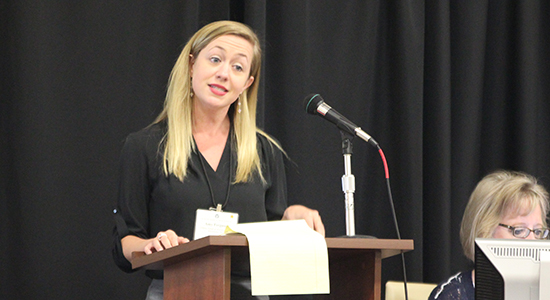
Amy Ferguson reports on progress of the New Lawyer Challenges Committee.
Board Approved Concept of Voluntary Certification Program for Paralegals
The board approved the concept of a voluntary paralegal certification program that the State Bar would develop and administer. This approval allows the creation of a working group to explore the program details, including fiscal and administrative impacts.
Under a current proposal, developed by the board’s CLE Committee, the State Bar would develop a program to grant certifications as a “State Bar of Wisconsin Certified Paralegal.” Certified paralegals must work under the supervision of a licensed attorney.
The program, as outlined in concept, would require paralegals seeking State Bar certification to successfully complete an approved paralegal studies program with Wisconsin-specific substantive content and skills training, complete 10 hours of continuing paralegal education every two years, and demonstrate good character. State Bar certified paralegals would also be subject to a set of ethical rules and obligations.
Kathryn Bullon, chair of the CLE Committee, previously noted that a certification program would help attorneys add value to their practices with highly trained paralegals and would help protect the public from the incompetent or unauthorized practice of law.
She noted that other state bars, including Florida, North Carolina, Ohio, and Texas certify paralegals, which allows the bar to actively shape how paralegals are regulated.
This isn’t the first time the State Bar of Wisconsin has reviewed this issue. The work of a task force in 2004 culminated in a petition to the Wisconsin Supreme Court.
It would have created a court-administered regulatory structure for paralegals. The court declined to create one, but invited the State Bar to consider a voluntary program.
Board Approves State Bar Executive Director Search Team
The board approved outgoing President Ralph Cagle’s appointments to the Transition and Search Team, which will conduct the search for the State Bar’s next executive director. Current Executive Director George Brown, who has served in that role for 16 years, announced that he will retire in June 2017.
Former State Bar President Michelle Behnke (2004-05) will chair the 12-person Transition and Search Team, which includes the three presidents for FY 2017 (July 1, 2016 to June 30, 2017): State Bar President Fran Deisinger (Milwaukee); State Bar Past-president Cagle (Madison); and State Bar President-elect Paul Swanson (Oshkosh).
Other appointees include: Amy Lindner (Milwaukee); Susan Miller (Waupaca); David Werwie (St. Paul); Christopher Rogers (Madison); Kevin Lyons (Milwaukee); Dean R. Dietrich (Wausau); Miriam Horwitz (Milwaukee); and Charles Stertz (Appleton).
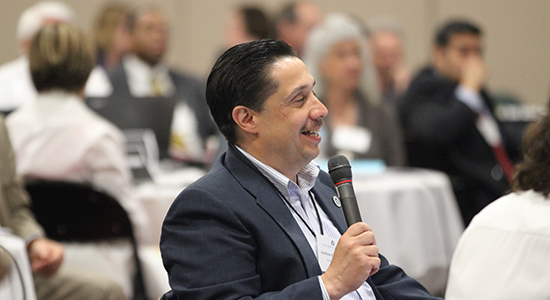
Dist. 2 Gov. Andrew Chevrez comments during the Board meeting. The board elected him along with five other members to the State Bar’s Executive Committee for FY 2017.
Board Supports Exoneree Compensation Policy
At the request of the State Bar’s Criminal Law Section, the board voted to take a policy position supporting modifications to statutes relating to compensation and support of persons exonerated of criminal convictions. The policy reads as follows:
“For those whom the justice system has failed through wrongful convictions and imprisonment, the State Bar of Wisconsin must ensure that exonerees are appropriately compensated for the injustice they suffered and the years of freedom they lost.
“This includes financial compensation both immediate and long-term along with access to support services to assist with job training and educational, health, and legal services after an innocent person’s release.”
An exoneree compensation bill with bipartisan support moved this past legislative session but ultimately failed. It would have provided up to $50,000 for every year an innocent person sits in prison, capped at a maximum of $1 million.
Currently, wrongfully convicted individuals who serve time in Wisconsin can receive up to $5,000 per year, capped at $25,000. Of the approximately 30 states with similar compensation statutes, Wisconsin’s rate is the lowest.
Board Approves New Strategic Priorities
The board approved new strategic priorities to be used in relation to the State Bar’s strategic plan, which guides State Bar efforts to help members with evolving challenges.
The board’s Strategic Planning Committee developed the new strategic priorities, in line with new vision and mission statements, and guiding principles approved in April. The strategic priorities direct the State Bar staff and leadership to:
-
make sustainable gains to increase access to justice for all;
-
advance public trust and promote a high functioning justice system through advocacy for the courts, the legal profession, and the public;
-
ensure commitment to diversity and inclusion, aligning with a guiding principle to optimize the potential of all State Bar members as well as the public the State Bar serves;
-
drive competitive advantage for the organization and State Bar members; and
-
maintain strong financial management and drive long-term revenue growth to support the State Bar’s mission to support members in a dynamic and diverse society in delivering valued professional services, promote access to justice, and pursue professional satisfaction.
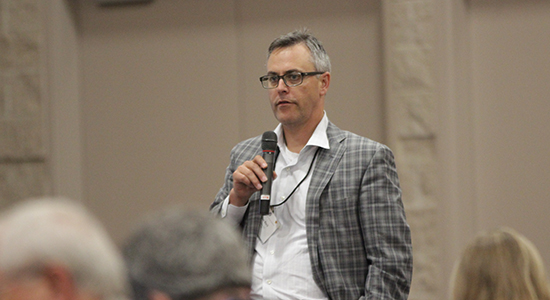
Dist. 9 Gov. Douglas Buck comments during the meeting.
Board Adopts Policy Committee Recommendations
The board adopted the recommendations of its Policy Committee to reaffirm six State Bar policy positions, sunset one, and adopt seven with amendments. The State Bar’s policy positions guide its lobbying efforts at the state and federal level.
The board reaffirmed policies on the Wisconsin Supreme Court’s administrative authority over all courts, and the inherent supervisory power over the practice of law.
It also reaffirmed policies on preserving the attorney-client privilege and opposing application of the Federal Trade Commission’s “red flags rule” – which requires creditors to establish identity theft prevention programs – to attorneys.
The board reaffirmed policies that require judges to be lawyers, support attorney supervision of licensed paralegals, oppose taxes on legal services, and oppose legislation that would require law firms to convert to an accrual method of accounting.
The board also amended policies that oppose any legislation to change curriculum requirements at the state’s law school or to regulate legal fees, which are addressed in attorney ethics rules and are subject to judicial branch review, control, and enforcement.
The State Bar would resist efforts to allow real estate licensees to provide legal advice with regard to real estate matters, under another policy that was affirmed but amended.
The board also affirmed but amended a policy to oppose any effort to transfer regulation of the bar to other branches of government, or restrict authority on fees and assessments related to the State Bar or the regulation of law practice.
A policy supporting unauthorized practice of law enforcement was amended, and the board voted to sunset a policy related to criminal penalties for providing legal advice on Medicaid under the Health Insurance Portability and Accountability Act (HIPAA).
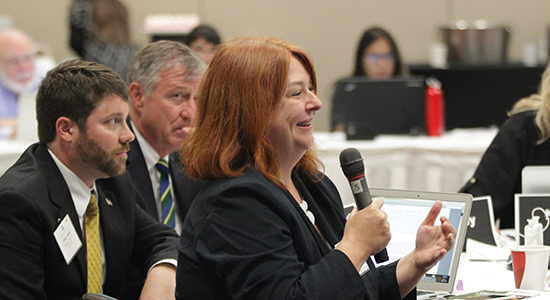
The board appointed Dist. 2 Gov. Amy Wochos as chairperson of the Board of Governors for FY 2017. Wochos serves as legal counsel to the Milwaukee County Circuit Court.
Board Appoints Wochos as FY 2017 Chairperson of the Board
The board appointed Dist. 2 Gov. Amy Wochos as chairperson of the Board of Governors for FY 2017. Wochos serves as legal counsel to the Milwaukee County Circuit Court.
Board Appoints Danner to Fill Term as Treasurer
The board appointed Dist. 16 Gov. John Danner (Minocqua) as State Bar treasurer to replace Paul Swanson (Oshkosh), who was recently elected as State Bar president-elect (starting July 1, 2016). Danner, of Harrold, Scrobell & Danner S.C., will serve the final year of a two-year term and take the treasurer seat on the State Bar’s Finance Committee.
Other Election and Appointments
-
Executive Committee: The board elected six members to the State Bar’s Executive Committee for FY 2017: James Casey Jr. (Washington, D.C.); Andrew Chevrez (Milwaukee); John Danner (Minocqua); John Orton (Mauston); Christopher Rogers (Madison); and Charles Stertz (Appleton). The other eight members of the 14-member Executive Committee include the three presidents, the board chair, and one representative from each of the State Bar’s four divisions.
-
District 13: The board appointed Adam Gerol, Ozaukee County District Attorney, to complete the one year remaining on Dist. 13 Gov. Robert Barrington’s term. Barrington was appointed as president-elect of the State Bar’s Government Lawyers Division (GLD) starting July 1 and retains a board seat as the GLD’s representative. Thus, Barrington resigns his governor seat as of June 30, 2016.
-
District 2: The board appointed Eric Andrews to complete the term of Dist. 2 Gov. Hannah Dugan, who was elected to the Milwaukee Circuit Court bench, upon her resignation. Under Wisconsin Supreme Court rules, members of the judiciary cannot serve on the State Bar board. Andrews will complete the one year remaining on Dugan’s term.
-
District 2: The board appointed John Birdsall (Milwaukee) to complete the term of Dist. 2 Gov. Amy Wochos in FY 2017. Wochos was appointed to serve as FY 2017 board chair.
-
ABA Delegates: The board elected three members to the ABA House of Delegates as representatives of the State Bar of Wisconsin: Jill Kastner (Milwaukee); Grant Killoran (Milwaukee); and John Skilton (Madison).
-
WisTAF Board: The board approved President Cagle’s five appointees to the Wisconsin Trust Account Foundation Board: Meghan Teigen (Madison); Robert Zellers (Madison); Eric Andrews (Milwaukee); Benjamin Lane (Chippewa Falls); and Timothy Radelet (Madison).
Other Business
Upon request, interested members may obtain a copy of the minutes of each meeting of the Board of Governors. For more information, contact State Bar Executive Coordinator Jan Marks by email or by phone at (608) 250-6106.
